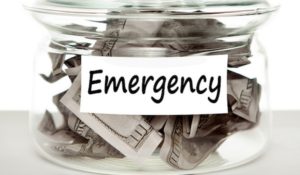Why You Need an Emergency Fund

An emergency fund will be your lifeline when you are faced with emergencies like road accidents, unforeseen illnesses, or sudden job loss. You could also need the money for unintended home repairs or car troubles. With an emergency fund, you will be able to tackle financially and emotionally draining situations gracefully because you will be prepared—at least financially. Here is an overview of what an emergency account is, why you need it and how much money you should keep in it.
What is an emergency fund?
By definition, an emergency fund is an account where you keep money to be used during emergencies. Ideally, such an account should have money equivalent to what you would typically spend on living expenses every three months. According to some financial planners, you should be able to use the fund to cover household expenses for six to 12 months. It is also important that the fund is liquid (easy to access and use in event of an emergency). To ensure this, put the funds in a savings or checking account. Notably, financial institutions do not provide an account just for emergencies. Therefore, you should open a separate savings account and label it an emergency fund. Then keep money in it to use when faced with a financially draining event.
Not having an emergency fund puts you at risk of financial ruin. Since everyone has emergencies, it is in your best interest to prepare for such events like job loss or health and dental emergencies. With an emergency fund, you can have confidence to face unexpected occurrences. If you do not have money to put into the account, you could always begin making some. One way is by doing work online. Examples of these are writing, being a virtual assistant, and getting pay from participating in a focus group. Also you can engage in forex trading with Forex brokerage companies like CMC Markets to help add to the pot.
Why You Should Have It
The main reason for an emergency fund is to provide you with cover during emergencies. However, there are three additional reasons why you should save funds to use on a rainy day. First, it will keep your stress levels down. Emergencies not only threaten your financial well-being, but they also cause anxiety. Having an emergency account puts you at ease during a crisis because lack of money will not cause additional stress. Further, an emergency fund helps you avoid misusing your money and making bad financial decisions. If you don’t have a reason to save your money, you may end up blowing it on unnecessary items like designer dresses, extravagant outings or expensive electronics, which will not help during a crisis.
Having an emergency fund, means you can’t spend money without good reason. By having an account just for emergencies, you’ll always know how much you have and what amount you still need to save. It really helps you plan. In an emergency, you won’t be tempted to borrow money that you will need to pay with interest or penalties.
How Much You Should Put In an Emergency Account
Not only should you have an emergency fund, you should also have one with enough money to provide you with cover should you need it. As a standard rule, your emergency fund account should have a minimum of six times what you earn every month. For example, if you make 1000 dollars monthly, you should have at least 6000 dollars in your emergency fund. This means that when tragedy strikes, you will be able to use this money for six months or more. Such cushion will help you get back on your feet faster because you will use your energy to tackle the crisis, not to look for money.
Conclusion
Hopefully, you now understand why you need an emergency fund. You have no control over when your house caves in, or when your job is declared redundant. What you have control over is your finances. As aforementioned, part of that preparation is having an emergency fund. It will help get your life back on track and encourage you to save money or at least use it responsibly. So start putting money in an emergency fund now!



Emergency funds are very important and I have had to rely on mine in the past. It feels great knowing it’s there when you need it!